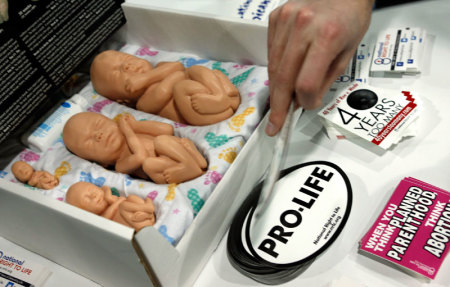Unborn babies feel pain as early as 12 weeks into a pregnancy: study

A preborn baby is able to feel pain as early as 12 weeks into a pregnancy, months earlier than previously assumed by most scientists, according to a newly published study.
The Journal of Medical Ethics published a study earlier this month by Stuart Derbyshire, professor of psychology at the National University of Singapore and John C. Bockmann, physician assistant at the Conner Troop Medical Clinic of Fort Drum, New York, titled “Reconsidering fetal pain.”
The authors of the study noted that while they hold differing views on the abortion debate, they question the “consensus” viewpoint that an unborn baby cannot feel pain until 24 weeks into a pregnancy.
“Reports often suggest that the cortex and intact thalamocortical tracts are necessary for pain experience. Given that the cortex only becomes functional and the tracts only develop after 24 weeks, many reports rule out fetal pain until the final trimester,” explained the study’s abstract.
“Here, more recent evidence calling into question the necessity of the cortex for pain and demonstrating functional thalamic connectivity into the subplate is used to argue that the neuroscience cannot definitively rule out fetal pain before 24 weeks.”
For example, noted the study, recent evidence from the field of neuroscience indicates that brain developments which begin at 12 weeks’ gestation could create a pain experience for a preborn baby.
“Overall, the evidence, and a balanced reading of that evidence, points towards an immediate and unreflective pain experience mediated by the developing function of the nervous system from as early as 12 weeks,” they concluded.
The study represents a change of mind on the question of the existence of fetal pain for Derbyshire, who is pro-choice and has worked with Planned Parenthood, reported Stephen Adams of the U.K. Daily Mail.
In 2006, Derbyshire wrote an article for the British Medical Journal in which he argued that “foetuses cannot experience pain,” according to the Daily Mail.
Micaiah Bilger of the pro-life website LifeNews.com noted in a piece on Monday that pro-life groups have been saying for years that preborn babies can, in fact, feel pain and the new study adds "further validity to the work of the pro-life movement."
"Abortions are cruel, painful procedures that kill unique, living unborn babies. In the second trimester, when strong evidence indicates unborn babies can feel pain, the most common abortion method is dismemberment," wrote Bilger. "This means every year, tens of thousands of unborn babies may be suffering excruciating pain as they are being torn apart limb from limb in their mothers’ wombs."
Last October, the American Medical Association filed a legal brief against a Kentucky law banning the dilation and evacuation abortion method with some exceptions.
Among their objections, the AMA took issue with the claim made by supporters of the legislation that they were preventing fetal pain, citing the 24-week timetable and that D&E abortions are frequently earlier in a pregnancy.
“Every major medical organization that has examined the issue of fetal pain, and several peer-reviewed studies, agree that ‘fetal pain perception is not possible before at least 24 weeks’ from last menstrual period,” claimed the AMA at the time. “[Furthermore,] medical literature shows that a fetus likely cannot experience pain at any gestational age, because it is kept in a sleep-like state by environmental factors in the uterus, including certain hormones and low oxygen levels.”





















